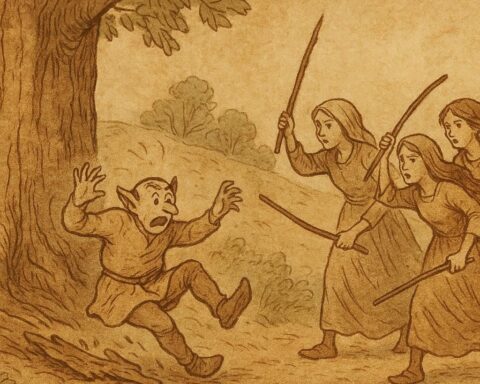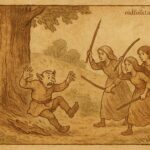Long ago, by the slow, winding waters of the Alwaro River, two young women named Achala and Ajulo went down with their spears, hoping to catch fish for their families. The river glistened in the sun, its currents carrying whispers of stories older than the village itself. A large fish swam past, sleek and shimmering. Quick as lightning, Achala thrust her spear and struck it, but before she could pull it out, Ajulo grabbed the wriggling fish and hauled it from the water.
“It’s mine!” Achala cried. “I speared it!”
“No! It’s mine!” Ajulo shouted back. “I pulled it out of the river!”
The fish flailed wildly as the two girls clung to it, Achala holding the tail, Ajulo gripping the head. Their quarrel grew louder and sharper.
Unseen by them, a man was crouched inside the hollow of a dead tree by the riverbank. His head was covered with leaves, and he fished quietly with his harpoon. Hearing the argument, he called out, “Don’t quarrel. Listen to me.”
Startled, the girls looked around. They saw a figure in the tree, though his face was hidden by the leaves. Still angry, they resumed pulling at the fish.
“Stop!” the man’s voice rang again.
They turned once more, but no one was in sight.
“Who speared the fish?” the man asked.
“I did,” said Achala firmly.
“Then it is yours,” the man replied. “I saw you strike it.”
“No!” Ajulo protested. “I pulled it from the water. It’s mine!”
“Oh, please,” the man urged gently, “do not quarrel. Drop the fish’s head, Ajulo. Do it for me.”
READ THIS: Obang and His Dog: An Anuak Folktale from Ethiopia
Reluctantly, Ajulo let go, but Achala could not hold the slippery tail alone. The fish wriggled free and splashed back into the river. The current carried it away.
“Where is the fish now?” the man asked.
“I lost it,” Achala admitted.
“Then catch another,” the voice said. “You must work for your food.”
The sisters returned to the village and told everyone: “We quarreled, and a strange man judged us. Yet we never saw his face.”
The next day, they returned to fish again. This time, Ajulo speared a fish, but Achala pulled it out. Their fight began once more.
“It’s mine,” Ajulo insisted. “I speared it!”
“But I dragged it out,” Achala said angrily.
Again, Achala clutched the tail and Ajulo the head. Again, the hidden man called out, “Don’t quarrel! Who speared the fish?”
“I did,” Ajulo answered.
“Then it is yours,” he said.
But Achala refused to yield. “No! I pulled it out.”
“Oh, please,” said the man, “drop the tail, Achala. Do it for me.”
This time, Achala let go. Ajulo held firmly, keeping the fish.
“Where is the fish now?” the man asked.
“I have it,” Ajulo said triumphantly.
“Then catch more,” the man replied. “You must work for your food.”
When they returned to the village, the girls repeated their story: “The strange man judged us again, but still, we did not see him.”
The chief, hearing this, commanded the people: “Tomorrow, we will all go to the river. We must discover this mysterious judge.”
So the entire village gathered by the water. Soon, the voice echoed once more.
“It comes from the bank!” said one.
“No, behind that rock!” said another.
“No, look in the tree!” a third cried. “There he is!”
The men climbed and dragged the stranger down from his hiding place. Two men held his arms, and they began leading him back to the village.
Suddenly, Achala shouted, “Look! He is not a man now, he is a bull!”
And it was true: the stranger had become a black bull.
Then Ajulo cried out, “No, look again, he is white!”
Indeed, the bull had turned white before their eyes. The beast tried to flee, but the men held firm.
Then the creature shifted once more, becoming a thick bush with branches, leaves, and fruit. But just as suddenly, the bush vanished, and in its place stood a beautiful woman. At last, when they reached the village, the figure became a man again.
The people gave him food, but he refused to eat. “He comes from the river,” they whispered. “Give him water.” The chief’s daughter brought a gourd.
But the man said, “Where is the mat to cover the gourd? Where is the stand to hold it? I cannot drink without these.”
So she brought the mat and the stand, and he drank.
The villagers declared, “Since he has drunk your water, he belongs with you.” And so the stranger stayed in her hut.
By morning, he was gone. In his place, under her cowskin, lay a necklace of shining cowrie shells.
The chief scowled. “He took you, yet gave me no bride price, only this necklace!”
Nine months later, the chief’s daughter bore a son. No one knew the father, so they called him Ony-ya, “the son of the stranger.” He grew swiftly, tall, strong, insatiable in hunger. In time, Ony-ya became king of the Anuak.
And from that day, every king of the Anuak wears the necklace of cowries at his crowning, bearing the name Ony-ya, the one who comes from the river.
Moral Lesson
This story teaches that disputes over greed lead only to loss, while fairness and patience bring lasting rewards. It also shows that destiny often arrives in mysterious forms, shaping the lives of families and nations. The Anuak remind us that the humble beginning of a child, even one born of mystery, can transform into a lineage of greatness.
Knowledge Check
Who were the two sisters who quarreled at the river?
Achala and Ajulo.
What did the hidden man do when the sisters fought over fish?
He judged their quarrel and decided who the rightful owner was.
What forms did the stranger transform into on the way to the village?
A black bull, a white bull, a bush, a woman, and back into a man.
What did the stranger leave behind for the chief’s daughter?
A necklace made of cowrie shells.
Who was Ony-ya, and what was his significance?
He was the son of the stranger, who grew to be king of the Anuak.
What traditional symbol does the Anuak king wear at his crowning?
The necklace of cowries, left by the river stranger.
Source: Anuak folktale, Gambela region, Ethiopia.






